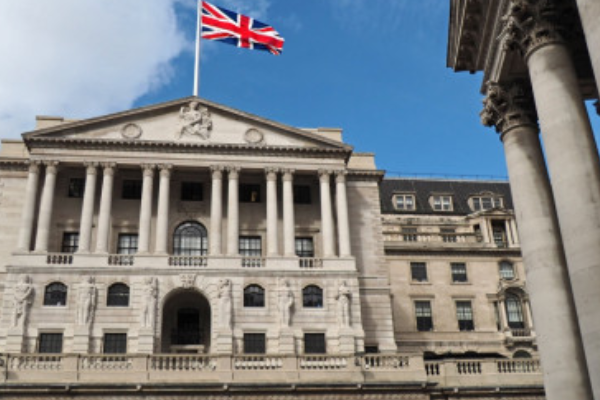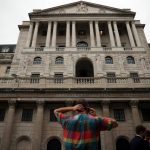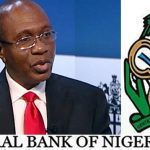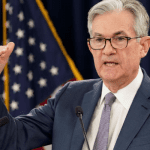The Bank of England is expected to hike interest rates to 3.5% or higher next week, but officials are divided on how much tightening is required to contain double-digit inflation as the economy enters recession.
According to the Bank of England’s Governor, Mr Andrew Bailey, future rate hikes were probable, though less than financial markets had anticipated prior to the meeting, when investors expected rates to reach 5.25% in mid-2023.
[wonderplugin_video iframe=”https://youtu.be/nJLh5HZFIIg” lightbox=0 lightboxsize=1 lightboxwidth=960 lightboxheight=540 autoopen=0 autoopendelay=0 autoclose=0 lightboxtitle=”” lightboxgroup=”” lightboxshownavigation=0 showimage=”” lightboxoptions=”” videowidth=600 videoheight=400 keepaspectratio=1 autoplay=0 loop=0 videocss=”position:relative;display:block;background-color:#000;overflow:hidden;max-width:100%;margin:0 auto;” playbutton=”https://www.tvcnews.tv/wp-content/plugins/wonderplugin-video-embed/engine/playvideo-64-64-0.png”]
Financial markets currently price in a 78% chance that the BoE will raise rates by half a percentage point to 3.5% on 15 December, and a 22% chance of a rise to 3.75%.
The central bank’s immediate concern is British consumer price inflation, which reached 11.1% in October, the highest level since 1981 and more than five times the BoE’s 2% objective, up from 4.2% the previous year.
While increasing energy prices have contributed to much of the increase, the Bank of England is concerned that labor shortages and other bottlenecks caused by the Covid-19 outbreak and Brexit may cause inflation to decline.
Although Bailey has stated that Britons must face lower living standards as a result of the energy price shock, the country is currently experiencing a wave of industrial action as trade unions strive to minimise the impact on their members.
The Bank of England is expected to hike interest rates to 3.5% or higher next week, but officials are divided on how much tightening is required to contain double-digit inflation as the economy enters recession.
According to the Bank of England’s Governor, Mr Andrew Bailey, future rate hikes were probable, though less than financial markets had anticipated prior to the meeting, when investors expected rates to reach 5.25% in mid-2023.
[wonderplugin_video iframe=”https://youtu.be/nJLh5HZFIIg” lightbox=0 lightboxsize=1 lightboxwidth=960 lightboxheight=540 autoopen=0 autoopendelay=0 autoclose=0 lightboxtitle=”” lightboxgroup=”” lightboxshownavigation=0 showimage=”” lightboxoptions=”” videowidth=600 videoheight=400 keepaspectratio=1 autoplay=0 loop=0 videocss=”position:relative;display:block;background-color:#000;overflow:hidden;max-width:100%;margin:0 auto;” playbutton=”https://www.tvcnews.tv/wp-content/plugins/wonderplugin-video-embed/engine/playvideo-64-64-0.png”]
Financial markets currently price in a 78% chance that the BoE will raise rates by half a percentage point to 3.5% on 15 December, and a 22% chance of a rise to 3.75%.
The central bank’s immediate concern is British consumer price inflation, which reached 11.1% in October, the highest level since 1981 and more than five times the BoE’s 2% objective, up from 4.2% the previous year.
While increasing energy prices have contributed to much of the increase, the Bank of England is concerned that labor shortages and other bottlenecks caused by the Covid-19 outbreak and Brexit may cause inflation to decline.
Although Bailey has stated that Britons must face lower living standards as a result of the energy price shock, the country is currently experiencing a wave of industrial action as trade unions strive to minimise the impact on their members.
The Bank of England is expected to hike interest rates to 3.5% or higher next week, but officials are divided on how much tightening is required to contain double-digit inflation as the economy enters recession.
According to the Bank of England’s Governor, Mr Andrew Bailey, future rate hikes were probable, though less than financial markets had anticipated prior to the meeting, when investors expected rates to reach 5.25% in mid-2023.
[wonderplugin_video iframe=”https://youtu.be/nJLh5HZFIIg” lightbox=0 lightboxsize=1 lightboxwidth=960 lightboxheight=540 autoopen=0 autoopendelay=0 autoclose=0 lightboxtitle=”” lightboxgroup=”” lightboxshownavigation=0 showimage=”” lightboxoptions=”” videowidth=600 videoheight=400 keepaspectratio=1 autoplay=0 loop=0 videocss=”position:relative;display:block;background-color:#000;overflow:hidden;max-width:100%;margin:0 auto;” playbutton=”https://www.tvcnews.tv/wp-content/plugins/wonderplugin-video-embed/engine/playvideo-64-64-0.png”]
Financial markets currently price in a 78% chance that the BoE will raise rates by half a percentage point to 3.5% on 15 December, and a 22% chance of a rise to 3.75%.
The central bank’s immediate concern is British consumer price inflation, which reached 11.1% in October, the highest level since 1981 and more than five times the BoE’s 2% objective, up from 4.2% the previous year.
While increasing energy prices have contributed to much of the increase, the Bank of England is concerned that labor shortages and other bottlenecks caused by the Covid-19 outbreak and Brexit may cause inflation to decline.
Although Bailey has stated that Britons must face lower living standards as a result of the energy price shock, the country is currently experiencing a wave of industrial action as trade unions strive to minimise the impact on their members.
The Bank of England is expected to hike interest rates to 3.5% or higher next week, but officials are divided on how much tightening is required to contain double-digit inflation as the economy enters recession.
According to the Bank of England’s Governor, Mr Andrew Bailey, future rate hikes were probable, though less than financial markets had anticipated prior to the meeting, when investors expected rates to reach 5.25% in mid-2023.
[wonderplugin_video iframe=”https://youtu.be/nJLh5HZFIIg” lightbox=0 lightboxsize=1 lightboxwidth=960 lightboxheight=540 autoopen=0 autoopendelay=0 autoclose=0 lightboxtitle=”” lightboxgroup=”” lightboxshownavigation=0 showimage=”” lightboxoptions=”” videowidth=600 videoheight=400 keepaspectratio=1 autoplay=0 loop=0 videocss=”position:relative;display:block;background-color:#000;overflow:hidden;max-width:100%;margin:0 auto;” playbutton=”https://www.tvcnews.tv/wp-content/plugins/wonderplugin-video-embed/engine/playvideo-64-64-0.png”]
Financial markets currently price in a 78% chance that the BoE will raise rates by half a percentage point to 3.5% on 15 December, and a 22% chance of a rise to 3.75%.
The central bank’s immediate concern is British consumer price inflation, which reached 11.1% in October, the highest level since 1981 and more than five times the BoE’s 2% objective, up from 4.2% the previous year.
While increasing energy prices have contributed to much of the increase, the Bank of England is concerned that labor shortages and other bottlenecks caused by the Covid-19 outbreak and Brexit may cause inflation to decline.
Although Bailey has stated that Britons must face lower living standards as a result of the energy price shock, the country is currently experiencing a wave of industrial action as trade unions strive to minimise the impact on their members.
The Bank of England is expected to hike interest rates to 3.5% or higher next week, but officials are divided on how much tightening is required to contain double-digit inflation as the economy enters recession.
According to the Bank of England’s Governor, Mr Andrew Bailey, future rate hikes were probable, though less than financial markets had anticipated prior to the meeting, when investors expected rates to reach 5.25% in mid-2023.
[wonderplugin_video iframe=”https://youtu.be/nJLh5HZFIIg” lightbox=0 lightboxsize=1 lightboxwidth=960 lightboxheight=540 autoopen=0 autoopendelay=0 autoclose=0 lightboxtitle=”” lightboxgroup=”” lightboxshownavigation=0 showimage=”” lightboxoptions=”” videowidth=600 videoheight=400 keepaspectratio=1 autoplay=0 loop=0 videocss=”position:relative;display:block;background-color:#000;overflow:hidden;max-width:100%;margin:0 auto;” playbutton=”https://www.tvcnews.tv/wp-content/plugins/wonderplugin-video-embed/engine/playvideo-64-64-0.png”]
Financial markets currently price in a 78% chance that the BoE will raise rates by half a percentage point to 3.5% on 15 December, and a 22% chance of a rise to 3.75%.
The central bank’s immediate concern is British consumer price inflation, which reached 11.1% in October, the highest level since 1981 and more than five times the BoE’s 2% objective, up from 4.2% the previous year.
While increasing energy prices have contributed to much of the increase, the Bank of England is concerned that labor shortages and other bottlenecks caused by the Covid-19 outbreak and Brexit may cause inflation to decline.
Although Bailey has stated that Britons must face lower living standards as a result of the energy price shock, the country is currently experiencing a wave of industrial action as trade unions strive to minimise the impact on their members.
The Bank of England is expected to hike interest rates to 3.5% or higher next week, but officials are divided on how much tightening is required to contain double-digit inflation as the economy enters recession.
According to the Bank of England’s Governor, Mr Andrew Bailey, future rate hikes were probable, though less than financial markets had anticipated prior to the meeting, when investors expected rates to reach 5.25% in mid-2023.
[wonderplugin_video iframe=”https://youtu.be/nJLh5HZFIIg” lightbox=0 lightboxsize=1 lightboxwidth=960 lightboxheight=540 autoopen=0 autoopendelay=0 autoclose=0 lightboxtitle=”” lightboxgroup=”” lightboxshownavigation=0 showimage=”” lightboxoptions=”” videowidth=600 videoheight=400 keepaspectratio=1 autoplay=0 loop=0 videocss=”position:relative;display:block;background-color:#000;overflow:hidden;max-width:100%;margin:0 auto;” playbutton=”https://www.tvcnews.tv/wp-content/plugins/wonderplugin-video-embed/engine/playvideo-64-64-0.png”]
Financial markets currently price in a 78% chance that the BoE will raise rates by half a percentage point to 3.5% on 15 December, and a 22% chance of a rise to 3.75%.
The central bank’s immediate concern is British consumer price inflation, which reached 11.1% in October, the highest level since 1981 and more than five times the BoE’s 2% objective, up from 4.2% the previous year.
While increasing energy prices have contributed to much of the increase, the Bank of England is concerned that labor shortages and other bottlenecks caused by the Covid-19 outbreak and Brexit may cause inflation to decline.
Although Bailey has stated that Britons must face lower living standards as a result of the energy price shock, the country is currently experiencing a wave of industrial action as trade unions strive to minimise the impact on their members.
The Bank of England is expected to hike interest rates to 3.5% or higher next week, but officials are divided on how much tightening is required to contain double-digit inflation as the economy enters recession.
According to the Bank of England’s Governor, Mr Andrew Bailey, future rate hikes were probable, though less than financial markets had anticipated prior to the meeting, when investors expected rates to reach 5.25% in mid-2023.
[wonderplugin_video iframe=”https://youtu.be/nJLh5HZFIIg” lightbox=0 lightboxsize=1 lightboxwidth=960 lightboxheight=540 autoopen=0 autoopendelay=0 autoclose=0 lightboxtitle=”” lightboxgroup=”” lightboxshownavigation=0 showimage=”” lightboxoptions=”” videowidth=600 videoheight=400 keepaspectratio=1 autoplay=0 loop=0 videocss=”position:relative;display:block;background-color:#000;overflow:hidden;max-width:100%;margin:0 auto;” playbutton=”https://www.tvcnews.tv/wp-content/plugins/wonderplugin-video-embed/engine/playvideo-64-64-0.png”]
Financial markets currently price in a 78% chance that the BoE will raise rates by half a percentage point to 3.5% on 15 December, and a 22% chance of a rise to 3.75%.
The central bank’s immediate concern is British consumer price inflation, which reached 11.1% in October, the highest level since 1981 and more than five times the BoE’s 2% objective, up from 4.2% the previous year.
While increasing energy prices have contributed to much of the increase, the Bank of England is concerned that labor shortages and other bottlenecks caused by the Covid-19 outbreak and Brexit may cause inflation to decline.
Although Bailey has stated that Britons must face lower living standards as a result of the energy price shock, the country is currently experiencing a wave of industrial action as trade unions strive to minimise the impact on their members.
The Bank of England is expected to hike interest rates to 3.5% or higher next week, but officials are divided on how much tightening is required to contain double-digit inflation as the economy enters recession.
According to the Bank of England’s Governor, Mr Andrew Bailey, future rate hikes were probable, though less than financial markets had anticipated prior to the meeting, when investors expected rates to reach 5.25% in mid-2023.
[wonderplugin_video iframe=”https://youtu.be/nJLh5HZFIIg” lightbox=0 lightboxsize=1 lightboxwidth=960 lightboxheight=540 autoopen=0 autoopendelay=0 autoclose=0 lightboxtitle=”” lightboxgroup=”” lightboxshownavigation=0 showimage=”” lightboxoptions=”” videowidth=600 videoheight=400 keepaspectratio=1 autoplay=0 loop=0 videocss=”position:relative;display:block;background-color:#000;overflow:hidden;max-width:100%;margin:0 auto;” playbutton=”https://www.tvcnews.tv/wp-content/plugins/wonderplugin-video-embed/engine/playvideo-64-64-0.png”]
Financial markets currently price in a 78% chance that the BoE will raise rates by half a percentage point to 3.5% on 15 December, and a 22% chance of a rise to 3.75%.
The central bank’s immediate concern is British consumer price inflation, which reached 11.1% in October, the highest level since 1981 and more than five times the BoE’s 2% objective, up from 4.2% the previous year.
While increasing energy prices have contributed to much of the increase, the Bank of England is concerned that labor shortages and other bottlenecks caused by the Covid-19 outbreak and Brexit may cause inflation to decline.
Although Bailey has stated that Britons must face lower living standards as a result of the energy price shock, the country is currently experiencing a wave of industrial action as trade unions strive to minimise the impact on their members.














